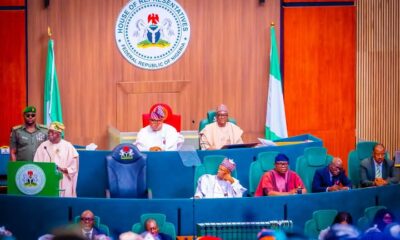Business
Agricultural Extension, Crucial To Achieving Food Security – Experts
Stakeholders at the pre-sea-son training for extension officers in Lagos State have highlighted the significance of agricultural extension delivery system in realising sustainable food security for the nations.
The stakeholders were gathered at a one-day training with the theme, “Agricultural Extension: A tool for achieving sustainable food security and economic development in Lagos state”, organised by the Lagos state Agricultural Development Authority (LSADA) at Oko Oba, Agege for extension officers in the state.
They stated that extension officers remain the intermediaries between research and farmers.
The Commissioner for Agriculture in the state, Abisola Olusanga, commended the Lagos State Agricultural Development Authority (LSADA), which is the Agricultural Extension arm of the Lagos State Ministry of Agriculture.
Olusanga said no country can achieve sustainable food security without a dynamic and strong agricultural extension delivery service system.
She said extension agents have played a key role in improving the status of the rural populace through regular visits and advisory services, especially in the areas of access to inputs and output markets, credit facilities, improvement in on-farm as well as other off-farm activities to complement seasonal farm earnings.
“It is in this regard that the State government has placed a high value on its Agricultural Extension officers and technical staff. They disseminate proven agricultural technologies which are tailored towards boosting agricultural development in the state”, she said.
Olusanya noted that through their activities many improved varieties of crops have been introduced to the state, such as, the yellow variety of cassava, which is high yielding and rich in vitamin A, which helps to prevent night blindness, orange flesh sweet potato (OFSP), a variety of potatoes rich in vitamin A.
“From the rural to urban areas of Lagos, the riverine to the upland areas. Extension agents make sure they disseminate agricultural messages to all areas of Lagos where farming is taking place. Introduction of drip irrigation system, integrated pests and production management (IPPM).
“In this era of changing climate and the challenges it poses to food production and availability, the efforts of the subject matter specialists (SMSs) and the extension agents are quite commendable, considering the various capacity building they are conducting and awareness they are creating in mitigating these challenges of food security”, She said.
Earlier in his welcome address, Mr. Alade Adewale, Ag. Programme Manager, LSADA, said the theme of the training marks the beginning of a journey towards innovation, sustainability, and prosperity.
“On the course of this training, we will delve into the latest advancements, exchange valuable insights, and equip ourselves with the knowledge and tools necessary to tackle the challenges that lie ahead.
“The state cannot achieve full and sustainable food security without a dynamic and strong agricultural extension delivery service system.
“Our role as extension officers is pivotal. We are the bridge between research and practice, between knowledge and action. It’s our responsibility to ensure that the wealth of information generated within the realms of research reaches the farmers’ fields, enabling them to optimise their yields, mitigate risks and enhance their livelihoods”, Adewale said.
Business
Tinubu’s RHI Doles Out N50m To 1,000 Kwara Petty Traders

Business
UBA To Educate SMEs, Business Owners On Withholding Tax

Business
Nigeria Losing $40b Annually From Maritime Sector – NIMENA
-

 News4 days ago
News4 days agoBayelsa Confirms Cholera Outbreak
-

 Featured4 days ago
Featured4 days agoRSG Rolls Out Healthcare Programmes To Mark Fubara’s Birthday
-
Opinion2 days ago
Fubara @ 50: Golden Sparkles And Magic Bullet
-
Business4 days ago
ARCON Faults Unethical Ads On Meta-Owned Platforms … Vows Sanction Against Perpetrators
-

 Featured2 days ago
Featured2 days agoTinubu Seeks Multifaceted Response To Terrorism, Other Security Threats
-
Nation2 days ago
N4bn Seized Assets, Arrest Of Kano Anti-Corruption Chair, Magaji, Raise Fresh Dust
-
Business4 days ago
NNPC Plans Mini NLNG Projects For Outside Pipeline Network Customers
-
Politics2 days ago
Celebrate Patriotic Citizens, Not Corrupt Politicians, Babalola Tells FG, States

